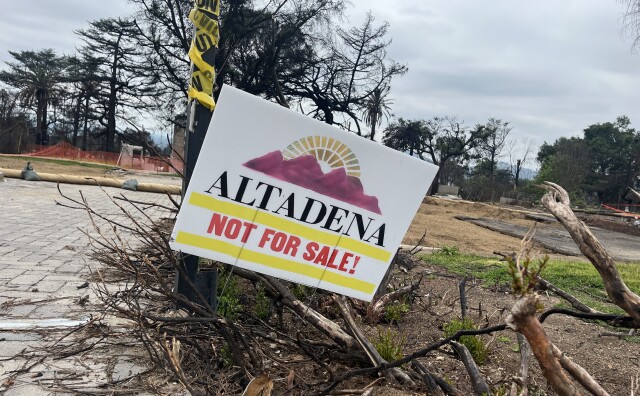With our free press under threat and federal funding for public media gone, your support matters more than ever. Help keep the LAist newsroom strong, become a monthly member or increase your support today.
This archival content was written, edited, and published prior to LAist's acquisition by its current owner, Southern California Public Radio ("SCPR"). Content, such as language choice and subject matter, in archival articles therefore may not align with SCPR's current editorial standards. To learn more about those standards and why we make this distinction, please click here.
From Farm to Street: Meet the Flatiron Truck
By Lindsay Armstrong/Special to LAist
Up until a few weeks ago, Chef Timothy Abell had never cooked anything in a food truck. Several days ago, Abell and his wife, Heather, debuted their Flatiron Truck to a hungry crowd lined up in front of Bolt Barbers Monkey House on Melrose in West Hollywood. By building their menu around locally farmed produce and ingredients inspired by the diversity of Southern California, the Flatiron Truck takes the “farm to table” movement one step further: to the streets.
Abell explains his philosophy behind bringing a fine dining experience to a wider audience: “The people that eat the best food are often the people that can pay for it. I think food should be a priority for everyone... I want to make it more fair.”
The truck’s menu features expertly crafted entrees—from the Flatiron Steak to the Farmer’s Market Salad—that rival many high-end restaurants. That’s no coincidence. Abell honed his craft in the kitchens of the Hungry Cat, Joe's, Water Grill and Wilshire. He counts the Hungry Cat's Kris Longley and David Lentz as mentors who shaped his cooking style. While working as a chef, he was responsible for searching out quality produce at farmer’s markets every week and has built longstanding relationships based on a shared appreciation for the freshest, best ingredients available each season. His meals demonstrate a love of California produce, seafood and meats and were part of the reason he decided to work and live in LA.
“I love Los Angeles. In Los Angeles, you don’t have as many ‘great’ restaurants, but you have more diversity.” This diversity inspires his cooking and has fostered relationships with a wide range of vendors, from Vietnamese Doughnuts shops in the San Gabriel Valley to California farmers at the Santa Monica Farmer’s Market. “It’s great to have a relationship with these famers. You pay a little bit more for some produce, but it makes you excited about preparing it.”
The menu reflects his admiration for the distinct variety of cuisine that is unique to a city like LA—with influences from Asia, Latin America, and Europe. This is evident in Abell’s Tuna Collar on Toast. Inspired by Japanese cooking, Abell roasts the tuna collar, sears it, and includes Sriracha (from LA’s own Huy Fong Foods) to compliment the flavor. Their signature Flatiron steak is prepared using a Sous-Vide Immersion Circulator, which is more commonly found in restaurants that specialize in molecular gastronomy—not standard equipment on your typical food truck. The result is an incredibly savory, flavorful steak (perfectly medium rare), served over pan-fried Sierra Gold potatoes (from the Rutiz Family Farms) infused with thyme, parsley, rosemary, garlic and shallots on a side of farm-fresh greens. Other delicious items include the incredibly tender asparagus served with minced herbs and farm-fresh eggs, and the Grilled Doughnut Holes dusted with Heather Abell’s own blend of spices and served with a zesty crème fraîche.
Although the set menu will include the Flatiron, the savory Pork Burger, the Grilled Doughnut Hole and the Tuna Collar, selections will change with market availability and as cuisine evolves in LA. However, Abell resolves to maintain the same experience for all: “You don’t have to make a ton of money, but you can still come to our truck and get high quality food.”
Menu items are priced from $3-$9 with specials posted daily. Their weekly schedule is available online and via Twitter.
At LAist, we believe in journalism without censorship and the right of a free press to speak truth to those in power. Our hard-hitting watchdog reporting on local government, climate, and the ongoing housing and homelessness crisis is trustworthy, independent and freely accessible to everyone thanks to the support of readers like you.
But the game has changed: Congress voted to eliminate funding for public media across the country. Here at LAist that means a loss of $1.7 million in our budget every year. We want to assure you that despite growing threats to free press and free speech, LAist will remain a voice you know and trust. Speaking frankly, the amount of reader support we receive will help determine how strong of a newsroom we are going forward to cover the important news in our community.
We’re asking you to stand up for independent reporting that will not be silenced. With more individuals like you supporting this public service, we can continue to provide essential coverage for Southern Californians that you can’t find anywhere else. Become a monthly member today to help sustain this mission.
Thank you for your generous support and belief in the value of independent news.

-
The Palisades Fire erupted on Jan. 7 and went on to kill 12 people and destroy more than 6,800 homes and buildings.
-
People moving to Los Angeles are regularly baffled by the region’s refrigerator-less apartments. They’ll soon be a thing of the past.
-
Experts say students shouldn't readily forgo federal aid. But a California-only program may be a good alternative in some cases.
-
Distrito Catorce’s Guillermo Piñon says the team no longer reflects his community. A new mural will honor local leaders instead.
-
The program is for customers in communities that may not be able to afford turf removal or water-saving upgrades.
-
More than half of sales through September have been to corporate developers. Grassroots community efforts continue to work to combat the trend.







